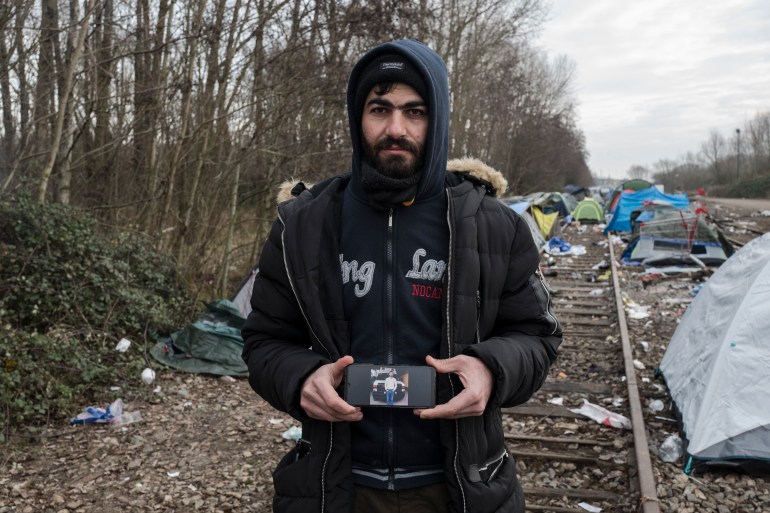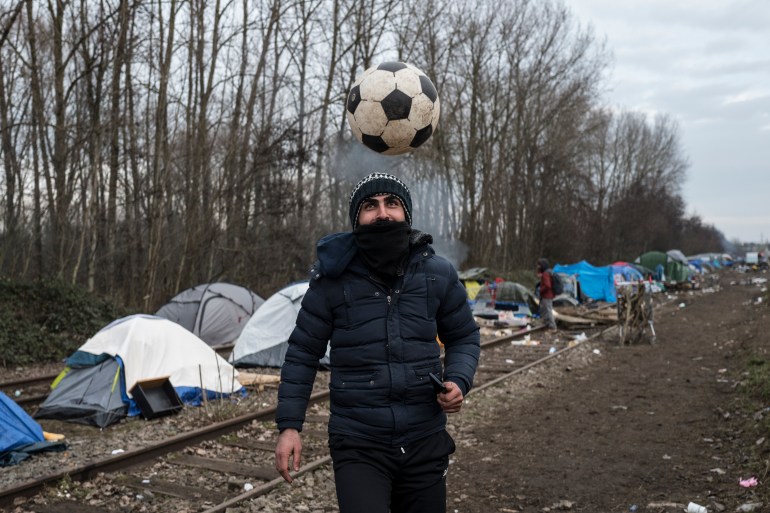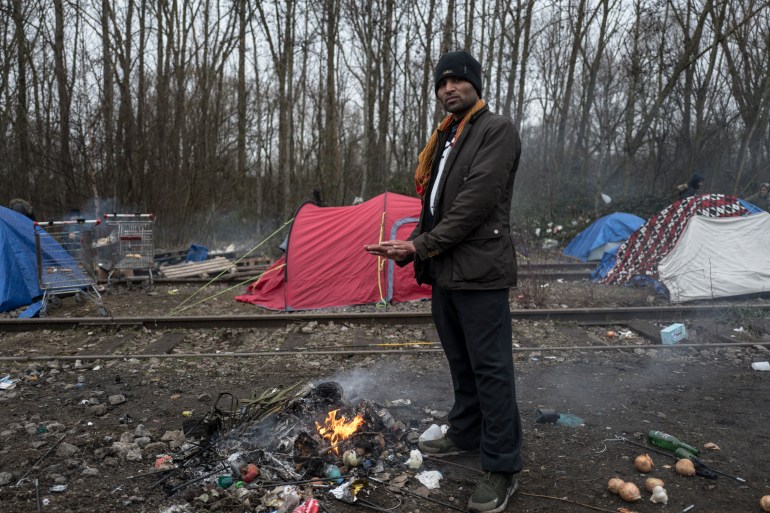Objects of affection: The things that refugees hold close
As people battle freezing temperatures at a makeshift camp in France, a scooter, football or a necklace bring hope.

Nord, France – Grande Synthe, a makeshift refugee camp close to Dunkirk and Calais, sits on an old railway line.
About 250 people live here and try to fight the bitter winter cold temperatures, which can drop to as low as -5 degrees Celsius (23 degrees Fahrenheit), by huddling in tents and small wooden shelters, or lighting fires.
Keep reading
list of 4 itemsRefugees in France: ‘I was in the boat yesterday, I almost died’
In 2021, the EU hardened its borders as new refugee crises flared
How killing of Syrian refugee marks an alarming trend in Turkey
Two months have passed since 27 people died in a refugee boat tragedy between France and the United Kingdom that shocked activists and spurred a diplomatic spat between the neighbours over how to stem crossings.
But the perilousness of the journey has failed to deter asylum seekers in northern France who hope to reach England.
Of the victims identified by French police, 16 were Iraqi Kurds, some of whom had been living at Grande Synthe, commonly known as the camp for Kurdish refugees in northern France.
Most refugees here are Kurdish, and there are women and lone children among them.
“Grande Synthe is run by Kurdish smugglers,” Claire Millot, the general secretary of the local charity Salam, told Al Jazeera. “In Calais, there are still people who have no smugglers, who try their luck alone.
“In Calais, life is much harder. Police evict people and take their tents every two days, but it’s a bit more comfortable, there are toilets, showers, and water points. In Grande Synthe, there is none of those things, but evictions are rarer, about two or three times a month.”
As they queue for water, food, and clothes donated by local NGOs, people find ways to keep their spirits up. Often, this is with storytelling – recounting memories from their homeland and praying to make it safely to England. These personal stories are embodied by the important objects they carried with them: a small girl loves her scooter, a young man keeps his football close, another wears a necklace of his country’s flag.
Al Jazeera spoke to refugees in Grande Synthe about their treasured objects:
‘This scooter is like my best friend’
Haven, 10, from the Kurdish region of northern Iraq
“I have no friends here, so this scooter is like my best friend. It means so much to me. I just got it two days ago from a local charity, a volunteer gave it to me, and I haven’t let go of it since. I used to have a bicycle similar to this in Rania, but I had to let it go when we left to make the journey. I kept thinking about it on our long way here, I felt so sad without it. I left everything in Kurdistan. Here I’m very poor, the scooter is the only thing I have. It makes me so happy to have it.
“I had to say goodbye to so many friends in Kurdistan. I used to take lots of boxing classes with many of them as well. I was a champion there, I’m very strong. I miss them all a lot, but I still talk to them using my mum’s phone. My friends ask me if I’m in France and how I’m doing, I tell them I’m happy, I’m going to England.”
‘This picture is very important to me’

Hide, 30, from the Kurdish region of northern Iraq
“This is a picture of me as an ambulance driver in Rania, Iraqi Kurdistan. This picture is very important to me. It makes me happy because it reminds me how I helped many people as an ambulance driver. People used to call me for help and I was there. During the COVID-19 pandemic, I was very busy especially. My salary was very low, but I never regretted any of it. I was happy because I was helping people. I did this job for eight years, and I hope I can do it again someday, maybe in England, but I don’t know if I’ll be given the opportunity.”
‘I was a professional football player’

Dyo, 25, from the Kurdish region of northern Iraq:
“I was a professional football player back in Kurdistan, I played for 15 years, even for the national team. I was a goalkeeper. My phone’s wallpaper is an image of Zidane, my favourite player. In 2006, when France lost in the World Cup final against Italy, I was so sad I didn’t eat for an entire day.
“Before coming here, I was in Germany for one year, but then they wanted to send me back to Bulgaria, the first country I arrived in [because of the Dublin regulation], so I left to Italy, and stayed there for two years, mostly in the northern city of Bolzano.
“I come from Soran in Iraqi Kurdistan, I left because all my friends left as well for Europe. I plan on going back now because my mother is very sick, and I really miss her and the rest of my family.
“I regret leaving Kurdistan now. When I was in Bulgaria, I regretted it especially because they put me in prison and gave me one small can of fish and a piece of bread in 24 hours. If I went back halfway, I’d feel ashamed. What would my friends think about me? If I spoke to my friends from back home now, trying to go to Europe, I would tell them ‘don’t go’. For some people, it works out, but for me, life was better over there.”
‘Since I left Afghanistan, I’ve had this necklace with me’

Senzai, 29, from Afghanistan:
“Eight months ago, I walked from Afghanistan to Austria, passing through Iran, Turkey, Greece and more. It was only after Croatia that I came by car, and also from Austria to France. I had no money to move another way. I left with a friend from Afghanistan, but we separated in Tehran. I’ve been in Grande Synthe for one month and I’ve already tried to cross two times. I can’t really explain why I want to go to England, I have some friends there, I’ve heard good things about it.
“Since I left Afghanistan, I’ve had this necklace with me, of the Afghan flag. In Hungary, when the police stopped us and stripped us of everything, I had to hide it. This necklace [is] so important to me because in Afghanistan we’ve given so many lives because of it, and now the Taliban don’t accept it. This flag is all of my heart. It’s made me very upset that the Taliban has taken over and removed it everywhere.”
‘A phone smuggler took my phone away’

Nowaz, 28, from Afghanistan:
“I am from the Logar province in Afghanistan, I was a farmer from a very young age. I’ve been in Grande Synthe for one week. I left Afghanistan five months ago. It was very dangerous for me, and I was scared of the Taliban. I think England is a good country, and I want to spend the rest of my life there. I like the law there, and I think people have a good sense of humanity.
“The phone was the most important thing for me to have, I could contact friends and family in Afghanistan, and find out information in Europe. But I was in Austria a week ago, and a smuggler pushed me and took my phone away, without reason. Now that I’m in Grande Synthe, without a phone, the few friends I have are the most important thing to me.”